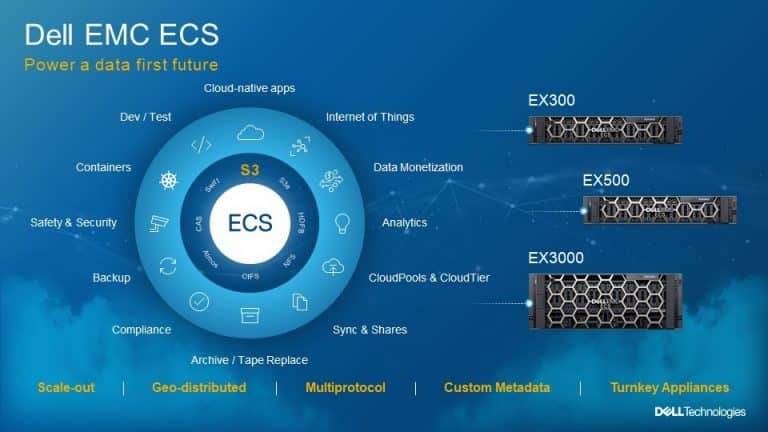Dell EMC has released an update to its object storage platform, the Dell EMC ECS version 3.5. ECS platforms have been engineered to support both traditional and next-generation workloads. With this product, the company claims unmatched scalability, manageability, resilience, and economics to meet the demands of modern business. Now, with the latest version, this platform further brings to organizations with some innovations made in the last few months.
Dell EMC has released an update to its object storage platform, the Dell EMC ECS version 3.5. ECS platforms have been engineered to support both traditional and next-generation workloads. With this product, the company claims unmatched scalability, manageability, resilience, and economics to meet the demands of modern business. Now, with the latest version, this platform further brings to organizations with some innovations made in the last few months.
Data growth continues to accelerate, and organizations must be equipped to power critical use cases such as line-of-business applications, websites, mobile apps, IoT data stores, analytics initiatives, long-term archives, and much more. To do so, companies must invest in storage technologies that empower them to capture all this data. Dell asserts that object storage systems are excellent candidates to do just that and that at Dell Technologies, they have a reliable platform for the job, Dell EMC ECS.
The latest step on Dell’s journey of continuous innovation brings the ECS 3.5 release. Critical features in this release include the possibility to add a 960GB SSD per node for better metadata read caching, replaceable DIY drive upgrades for tech-savvy customers, new integrations with Hadoop, and more.
Dell, through its official blog, shares a full highlight of features and capabilities:
- SSD for metadata read caching: Organizations looking to unlock more performance from their ECS appliances now have the option to include a 960GB flash drive per node. This improves system-wide read latency and IOPS, supporting analytics workloads which require faster reads of large data sets.
- Streamlined tech refresh functionality: We’ve made it even easier to migrate to the latest generation of ECS hardware via a non-disruptive upgrade process. By streamlining the evacuation of data from old nodes within a cluster, organizations can ensure continuity of operations while extending the life of their ECS investments.
- Customer replaceable drive upgrades (CRU): We’ve also enabled customers to take a DIY approach to replacing faulty drives. Now, with ECS 3.5, tech savvy IT teams don’t have to rely on an onsite Dell technician for break-fix, accelerating time-to-resolution.
- IAM support with object tagging: ECS 3.5 introduces support for identity and access management (IAM) with object tagging which provides IT departments more granular controls over resource access. Organizations can more easily incorporate company-defined user policies to improve their overall security posture.
- S3a support: ECS 3.5 also unlocks unique analytics and big data scenarios by enabling Hadoop data to be stored on ECS using the S3a protocol. This new capability has been certified for Cloudera’s QATS suite and integrates with IAM features to improve security for Hadoop workloads.
With these latest enhancements, Dell stated it’s the appropriate time to think through how ECS can unlock the value of the data. Whether organizations want to stand up cost-effective archives, modernize existing apps to take advantage of the simplicity of Dell’s object architecture, or support the development of cloud-native applications, the versatility and economics of ECS make it all possible on one single platform.
Engage with StorageReview
Newsletter | YouTube | Podcast iTunes/Spotify | Instagram | Twitter | Facebook | RSS Feed

